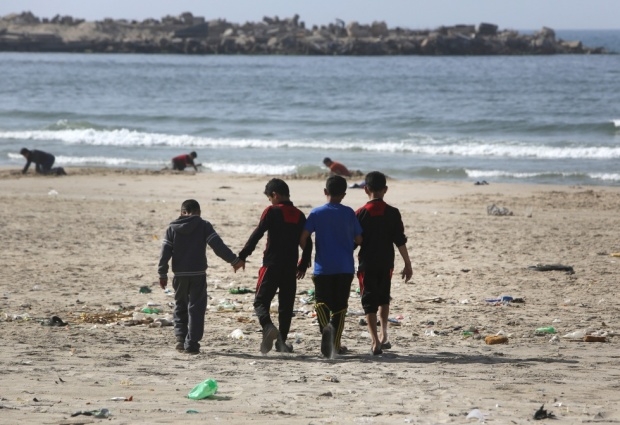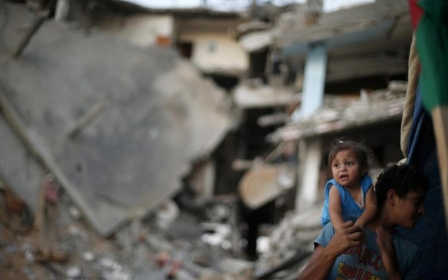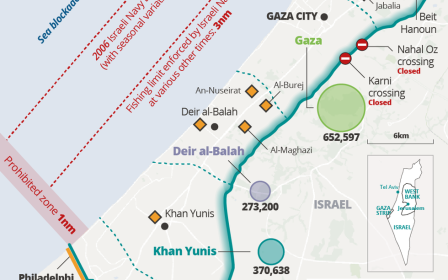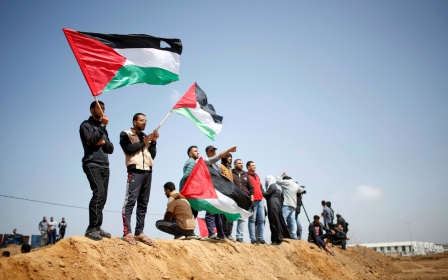Gaza's children deserve to be rescued like the boys in Thailand
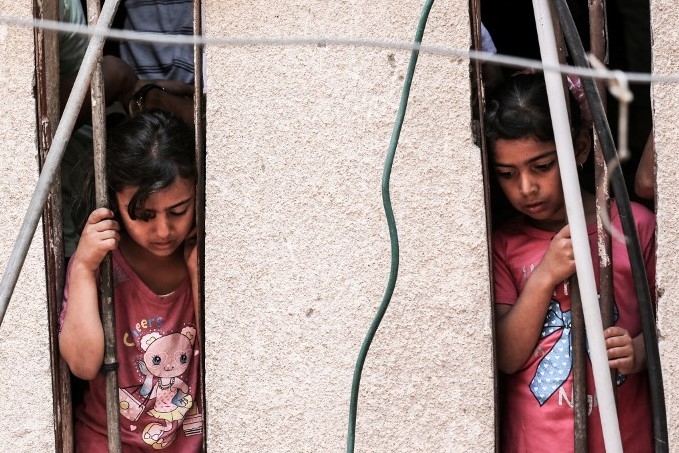
The whole world rejoiced when 12 boys trapped in a cave in Thailand were rescued alongside their football coach. Divers from around the world risked their lives to help the children, a truly remarkable and selfless act. One died in the process.
The darkness, uncertainty, hunger and hopelessness that the children must have experienced reminded me of the predicament of Palestinian children in Gaza - trapped through no fault of their own. Their only crime is being born Palestinian under occupation by a state that sees them as an irritant, a demographic threat and collateral damage if they die at the hands of Israeli forces, as some did in the Great March of Return.
A whole generation born under siege, they have not seen the villages from where most of their families hail. They hear of Jerusalem, al-Aqsa, Haifa, Yaffa, Jericho, Nablus and Hebron, but they have not seen them, even though these places are just a short distance away.
Israel as a violent entity
These children march with their families to the fence with Israel, demanding to return to their villages. Instead, they are met with the brutality of the occupier, as dozens are killed and thousands injured. They see posters of the martyred, including 21-year-old medic Razan al-Najjar, and ask why they were shot dead.
The answer, always, is because this is what Israel does. Their experience with Israel shows it as a violent entity, not the democracy that its spokespeople try to spin.
If the Trump team believes that Palestinians in Gaza are simply looking for some economic relief, then they are as naive now as when they began their sordid endeavours
The daily lives of children in Gaza are miserable, as they have little access to electricity or clean water, but plenty of exposure to Israeli bombs and that unmistakable sound of Israel's terror drones, which occupy Gaza's sky.
They see what the world looks like on TV, but quickly realise that at the current rate, they have no chance of ever experiencing it for themselves. They aspire to go to university, but quickly realise that the pride they will one day feel at graduating will be followed by great disappointment as they struggle to find employment.
Their Thai counterparts eventually saw freedom, but the children of Gaza and their families cannot see their own freedom coming any time soon.
Immovable Hamas
Gaza is a prison with two land crossings: one to Israel and the other to Egypt, both almost continuously sealed. More than a decade of an immoral siege has not brought a capitulation by Hamas or an uprising against it by those it rules.
Hamas in Gaza is a fact on the ground that is immovable. The siege only hurts the people, inciting Gaza's children to hate Israel for the death and the destruction it has heaped on their tiny sliver of land, the most densely populated in the world.
They see the efforts put in to rescue the Thai boys and wonder why nobody cares as much about them. They hear that US President Donald Trump has a plan to help them and that his most senior advisers are on the case, but conversations in the besieged enclave fill them not with hope, but with fear that their leaders are being pressured to abandon their struggle and surrender if they want a better daily life under permanent occupation.
After claiming to have taken Jerusalem "off the table" by recognising it as Israel's capital and moving the US embassy there, Trump's team has been consulting further in the region on the administration's plan to deliver "peace" to the holy land. But the US action has failed to create a climate for peace, as evidenced by the ongoing Great March of Return and Palestinians' decision to sever contact with the Americans.
The mirage of the 'ultimate deal'
Despite the Palestinian Authority's refusal to discuss the deal, the Americans appear to be moving to implement the second stage of the yet-unpublished plan - that of bringing economic relief to Gaza, funded by some of the Gulf states. If the Trump team believes that Palestinians in Gaza are simply looking for some economic relief, then they are as naive now as when they began their sordid endeavours.
Gaza's children are even more confused after Israeli Prime Minister Benjamin Netanyahu recently opted to tighten the noose around them by closing the "commercial crossing" at Kerem Shalom as punishment for the continuing rudimentary kites and balloons launched from Gaza, which have damaged crops on the Israeli side of the fence. Israel has attacked those launching what they bizarrely call “terror kites”.
If the heavy sacrifices made by Gaza's Palestinians since the Great March of Return began on 30 March are not sufficient evidence that "economic peace" is a mirage, then the US, Israel and their new Arab allies have underestimated Palestinians' resilience and their insistence on attaining their rights. As far as the Palestinians are concerned, the Americans will not be able to use Gaza to prop up their heavily damaged “ultimate deal”.
The Trump administration should take inspiration from the rescue of the Thai boys, planned meticulously to end their predicament, not to serve an ideological goal of helping Israel to entrench its control over the whole of historic Palestine. They should act to end the suffering of the two million Palestinians in Gaza, without preconditions, and give its children some hope for an end to their imprisonment - just as the brave divers did for the Thai boys in the cave.
- Kamel Hawwash is a British-Palestinian engineering professor based at the University of Birmingham and a longstanding campaigner for justice, especially for the Palestinian people. He is vice chair of the British Palestinian Policy Council (BPPC) and a member of the executive committee of the Palestine Solidarity Campaign (PSC). He appears regularly in the media as a commentator on Middle East issues. He runs a blog at www.kamelhawwash.com and tweets at @kamelhawwash. He writes here in a personal capacity.
The views expressed in this article belong to the author and do not necessarily reflect the editorial policy of Middle East Eye.
Photo: Palestinian children attend the funeral of 21 years old Razan al-Najjar after she was shot dead by Israeli soldiers, in Khan Yunis on 2 June, 2018 (AFP)
Middle East Eye propose une couverture et une analyse indépendantes et incomparables du Moyen-Orient, de l’Afrique du Nord et d’autres régions du monde. Pour en savoir plus sur la reprise de ce contenu et les frais qui s’appliquent, veuillez remplir ce formulaire [en anglais]. Pour en savoir plus sur MEE, cliquez ici [en anglais].



